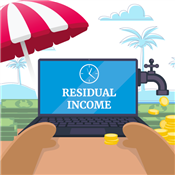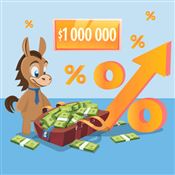Accredited Investor Opportunities
Some investments are only open to accredited investors. But which ones will align with your goals and risk tolerance? Read on to find out.
 |
Here are the top 9 accredited investor opportunities:
- Percent for private credit
- Masterworks for art
- Yieldstreet for diverse products
- Acretrader for farmland
- Crowdstreet for commercial real estate
- Equitybee for Pre-IPO stock options
- Arrived for rental properties
- EquityMultiple for CRE-Funds
- RealtyMogul for CRE properties
Online Alternative Investments
- Exclusive access to private market investments
- Wide range of alternative investments like art, real estate, legal financing, and more
- Goal-based investing for growth or income
- Minimums starting from $10,000
Invest in Private Companies
- Invest in pre-IPO companies through an EquityZen fund.
- $10,000 minimum investment
- Available to accredited investors only
Invest in High-Growth Startups
- Access Hundreds of Startups at Past Valuations
- Diversify Your Portfolio with High Growth Startups
- Invest in a Previously Inaccessible Asset Class
Accredited investors are the most qualified investors in the business. To qualify, you'll need to meet one or more requirements in income, net worth, asset size, governance status, or professional experience.
As an accredited investor, you have access to more complex and sophisticated types of securities. But what makes these financial ventures worth it despite their risks?
In this article, you'll learn about the various assets, minimum requirements, and investing platforms offered for accredited investors.
Best Accredited Investors Opportunities
Enjoy access to these alternative investment opportunities as an accredited investor. Read on.
Accredited investors typically have an income of over $200,000 individually or $300,000 jointly with a spouse in each of the last two years.[1]
Percent: Best For Private Credit
| Assets | Private Credit |
|---|---|
| Minimum Investment | As low as $500[2] |
| Target Holding Period | As short as 1 month[3] |
Percent is a private credit investment platform. It lends money to businesses and individuals who can't access traditional lenders such as banks.
To earn, you just need to sign up, invest in a note offering, and wait for its maturity. It's a great source of passive income as you don't need to monitor it closely and it has a short holding period.
Good annual returns range between 15% and 24% for this asset class.[4] However, when the company you invested in defaults on its debt, you may risk losing all your investment.
If you don't have time to research each deal properly, try Percent's Blended Notes. It diversifies your portfolio for you, but you pay an extra 1% annual management fee. Plus, the minimum is $10,000.[5]
Percent does not charge fees on individual notes unless you profit. Every time you receive your earnings, it takes 10%. For example, in an APY of 15%, you will pay 1.5% in fees. [6]
Pros + Cons
|
|
Masterworks: Best For Art
| Assets | Contemporary Art |
|---|---|
| Minimum Investment | $15,000[7] |
| Target Holding Period | 3-10 Years[8] |
Masterworks is a platform that securitizes blue-chip artworks for investments. It buys an artwork through auction, then it registers that asset as an LLC. Starting at $15,000, you can invest in this low-risk asset class.
You earn money by buying and holding your shares. Buy when it's offered, and then you receive pro-rated gains once Masterworks sells the artwork.
Although the target period is 3-10 years, when the artwork reaches the desired value, it can be sold earlier. On its website, the best appreciation of an artwork was a whopping 788.9%, and it was only held for 29 days.[9]
On the other hand, an artwork held for 282 days was sold with just a 4% increase. Some artworks held for 3 years only had a 17.6% increase.
Aside from the 1.5% annual management fee, Masterworks receives a 20% of the profit when it sells the artwork.[10]
Pros + Cons
|
|
Yieldstreet: Best For Diverse Products
| Assets | Real Estate, Venture Capital, Private Equity, Private Credit, Short Term Notes, Structured Notes, Diversified Funds, Transportation, Art, Legal Finance |
|---|---|
| Minimum Investment | Starts at $10,000[11] |
| Target Holding Period | Varies (3 months - 5 years)[12] |
Yieldstreet is an investment platform that offers everything alternative. It offers 10 alternative assets from real estate, to art, to structured notes. Its minimum starts at $10,000.
Yieldstreet has the broadest offering across alternative investment platforms, so the amount you can earn and its holding period vary. There are products that you can hold for as short as 3 months and as long as 5 years.
Typically, you can earn through dividends and share appreciation over time. Dividend payment frequency is not fixed. It can either be paid to you monthly, quarterly, or once an event occurs.
One of the downsides here is the lower annual return rate compared to specialized platforms. Although it offers the same products, some of its competitors outperform it.
Its management fee generally ranges from 1% - 4% annually.[13]
Pros + Cons
|
|
Online Alternative Investments
- Exclusive access to private market investments
- Wide range of alternative investments like art, real estate, legal financing, and more
- Goal-based investing for growth or income
- Minimums starting from $10,000
Acretrader: Best For Farmland
| Assets | Farmland |
|---|---|
| Minimum Investment | $15,000 - $40,000 depending on land size[14] |
| Target Holding Period | 3 - 10 Years |
AcreTrader lets you invest in farmland through fractional shares investing. It flips farmland for profit. In addition, it receives rent income from the farmers during the holding period.
As an investor, you can earn in two ways:
- Annual cash yield
Receive dividends or cash yield every December from the rent paid by tenant farmers. - Share price appreciation
Gain pro-rated income from the sale of the farmland at the end of the holding period.
The target holding period is 3-10 years. However, if a property gains enough value, it can be sold earlier. One of its offerings was closed in just 1.4 years with a 15.5% realized gain.[15]
Farmland as an asset has historically low volatility, which makes this a great option for risk-averse investors. That being said, all investments still carry a certain level of risk.
AcreTrader charges a 0.75% annual servicing fee based on the land value and a 2.5% pass-through closing fee per investment. Additionally, there's a 5% fee upon the sale of the entire property.[16]
Pros + Cons
|
|
Crowdstreet: Best For Commercial Real Estate
| Assets | Commercial Real Estate |
|---|---|
| Minimum Investment | Marketplace/C-REIT: $25,000; Thematic Funds: $100,000+[17] |
| Target Holding Period | Varies; 3 - 10 Years |
CrowdStreet is a commercial real estate investment platform. It invests in various deals such as multifamily, self-storage, and industrial properties.
You can invest in two ways:
- Individual properties
Choose a single property to invest in if you prefer building your portfolio. - Diversified funds
Managed fund by CrowdStreet Advisors, which automatically diversifies your investment across various properties.
When you invest in a CrowdStreet offering, you can receive both a cash yield and pro-rated gains at the end of the holding period.
The minimum investment can vary, but it usually starts at $25,000 for marketplace offerings and C-REIT. For Thematic Funds, it can reach up to $100,000+.
Real estate can be typically low risk, but returns are not guaranteed. While some assets may return 88% in 0.6 years, some assets lose their value 100%. In the history of CrowdStreet, more than 10 properties have negative 100% returns.[18]
CrowdStreet does not charge any fees, but you might need to pay sponsors fees for the management of the properties.[19]
Pros + Cons
|
|
Equitybee: Best For Pre-Ipo Stock Options
| Assets | Employee Stock Options |
|---|---|
| Minimum Investment | $10,000[20] |
| Target Holding Period | None; exit depends on an event |
Equitybee is a place for investors to fund the stock options of employees in VC-backed startups. While you won't get ownership here, you can potentially get a share of the profit once the startup successfully does an exit event, like an IPO or M&A.
Many good companies remain private and, therefore, often inaccessible to investors. At Equitybee, you can fund the stock options of employees at Stripe, Reddit, and Starlink. Therefore, despite being private, you can potentially profit once these good companies have an exit event.
The minimum investment is $10,000. Although this platform can potentially give you big returns, you can also lose your entire money if the startup fails.
Since the transfer of the securities is manual, there's a risk that employees will refuse to abide by the contract. In this case, Equitybee will exercise its power of attorney to inform the issuer of the stock to initiate the transfer.
Pros + Cons
|
|
An employee stock option is a compensation benefit for startup employees to buy shares at a fixed, typically lower, price during an exit event in the future. So when it's time to exercise the option during an IPO or M&A, they can benefit from the potential increase of the share price by having a contract that allows them to buy it at a discount.
Invest in High-Growth Startups
- Access Hundreds of Startups at Past Valuations
- Diversify Your Portfolio with High Growth Startups
- Invest in a Previously Inaccessible Asset Class
Arrived: Best For Rental Properties
| Assets | Real Estate, Private Credit |
|---|---|
| Minimum Investment | Starts at $100[21] |
| Target Holding Period | 5 to 15 years |
Arrived is a real estate crowdfunding platform. It builds and operates rental properties funded by you and the other investors.
With just $100, you can already start buying Arrived shares, which represent your partial ownership of a specific property.
To start investing, choose an offering on the Arrived website, buy shares, and hold them. During the holding period, you will receive monthly dividends. After 5 to 15 years, Arrived will sell the rental property, and you will get the pro-rated value of your investment.
Aside from individual rental properties, Arrived also offers diversified funds for investors who want a more balanced portfolio.
The amount and frequency of the fees vary and will depend on the type of property you invest in.
Pros + Cons
|
|
Equitymultiple: Best For Cre-Fund
| Assets | Commercial Real Estate, Funds, Notes |
|---|---|
| Minimum Investment | Starts at $5,000[22] |
| Target Holding Period | Varies |
EquityMultiple is also an investment for commercial real estate (CRE), but one of the most attractive features of this platform is the Alpine Note and Ascent Income Fund.
Alpine Note is a short-term note that gives you relatively high returns in a short period. It can either be 3, 6, or 9 months long and has a fixed APY of 6.10% to 7.5%.[23]
It also offers the Ascent Income Fund, which invests in CRE-related senior debt loans. Historically, this income fund has outperformed the Yieldstreet Alternative Income Fund (formerly known as Yieldstreet Prism Fund) and PIMCO Income Fund. Investors will be able to withdraw the amount after 1 year.
Other features you can invest in include buying and holding shares of commercial spaces such as industrial and multifamily properties.
However, some users have complained about their lack of transparency. Apparently, EquityMultiple doesn't communicate losses promptly. Plus, they no longer publish the historical performance of each fund.
Pros + Cons
|
|
RealtyMogul: Best For CRE Properties
| Assets | Real Estate |
|---|---|
| Minimum Investment | Varies, typically starts at $25,000 or $35,000 |
| Target Holding Period | 3 to 7 years |
RealtyMogul is a real estate investment platform with a very diverse offering. It includes commercial, hospitality, industrial, multifamily, residential properties, etc.
With Realty Mogul's individual property offerings, you can make money from rental dividends or property appreciation. The minimum investment varies, but it usually starts at $25,000.[24]
The realized IRR for RealtyMogul's past investments ranged from a 109.7% gain to a 100% loss. However, these are outliers. The second-highest gain is 54.4%, and the next major loss is -7.2%.[25]
RealtyMogul also offers an Income REIT. This fund has an annual cash yield of at least 6% net of fees for 93 consecutive months. Minimum investment starts at $5,000. [26]
The Income REIT has an annual management fee of 1%, but the fees for the individual offerings vary per property.
Pros + Cons
|
|
Other Ways to Invest as Accredited Investor
If you are still looking for other investment opportunities, here are some of your options:
- Hedge Funds
Hedge funds use various investment strategies to deliver positive returns to its investors, but they're quite exclusive.The minimum investment starts at hundreds of thousands for these funds. Access is also limited, so you need to network accordingly to start investing.
- Fine Wine
Similar to fine art, there is an investment opportunity in fine wine and rare whiskey.At Vinovest, you can buy-and-hold wine bottles and whiskey casks for profit. Plans range from $1,000 to $250,000.[27]
- Venture Capital
Venture capital investing is a high-risk, high-reward endeavor fit for an accredited investor.Crowdfunding platforms like StartEngine let you buy shares directly from early-stage startups. You can also network or join an angel investing group to gain direct access to founders.
- Grocery-Anchored Commercial Real Estate
First National Realty Partners is one of the companies offering commercial real estate investment opportunities.Their properties are anchored by grocery stores, ensuring steady foot traffic and demand. To learn more, simply schedule a call to attend a deal webinar.
What is an Accredited Investor?
An accredited investor is someone who meets SEC financial or professional standards, giving them access to high-risk, complex, and costly investment vehicles.
Some of the other opportunities they can access include private equity, venture capital, private placements, private credit, hedge funds, and more.
One way to be a qualified purchaser is to have $5,000,000 or more in investments. So most likely, qualified purchasers can invest in the same things as accredited investors, but not vice versa.
How to Qualify As An Accredited Investor
You can qualify as an accredited investor using two criteria: financial and professional capabilities.[28]
Based on financial criteria, you can be an accredited investor if you have:
- A net worth of over $1,000,000 aside from your primary residence
- An individual annual income of $200,000 for the past 2 years and expect the same in the current year.
On professional criteria, you are an accredited investor if you are:
- Holding the Series 7, Series 65, or Series 82 license
- A "family client" of a "family office" that qualifies as an accredited investor
- A director, executive, or general partner of the company selling the securities
- Considered "knowledgeable employees" of the fund (for private fund investments)
If you meet these requirements, the investment platform will request the necessary proof according to their onboarding process. This can include financial documents, tax returns, bank statements, etc.
There's no "exam" that grants an accreditor investor license.
Risks of Accredited Investments
Accredited investments aim to beat the returns of the stock market, so they tend to be high-risk. They can be volatile, illiquid, expensive, and sometimes unregulated.
While volatility can give you high gains, it can also result in significant losses. In the worst-case scenario, you might even lose your entire capital.
Due to the nature of the underlying asset, some offerings cannot be easily sold or liquidated. Some even require holding periods of 3 to 5 years, or longer.
For the costs, some admin fees can be quite steep. The minimum investment is also high. So if your investment fails, you could lose a big chunk of your portfolio.
Some of these accredited investments are not as strictly regulated as the stock market. The burden is on the investor to know what they're dealing with.
Methodology
One of the most important things for an accredited investor is to protect their capital and grow it at the same time, so we chose assets that can match such various risk appetites.
Modern investing platforms, especially those that offer alternative assets, can be quite unpredictable. So we only considered those that have at least shown considerable results in the past.
To ensure that accredited investors will be able to form a comprehensive and diverse portfolio, we chose platforms that could meet each liquidity need from short-term to long-term holdings.
Bottom Line
There are various investment opportunities accredited investors can explore. But some are riskier than others, and it would depend on your risk appetite whether you'd go for it or not.
Before choosing a platform, do a lot of research about which asset you'd like to trade, see if you're fine with the liquidity options it has, and if it has decent returns for you.
References
- ^ U.S. Securities and Exchange Commission. Accredited Investor, Retrieved 01/23/2025
- ^ Percent. FAQ: What is the minimum amount of money I can invest?, Retrieved 01/23/2025
- ^ Percent. Why Percent?, Retrieved 01/23/2025
- ^ Percent. Recently Launched, Retrieved 01/23/2025
- ^ Percent. Blended Notes, Retrieved 01/23/2025
- ^ Percent. FAQ: Are there fees to invest on the Percent platform?, Retrieved 01/23/2025
- ^ Masterworks. FAQ: Is there a minimum investment for Masterworks?, Retrieved 01/23/2025
- ^ Masterworks. How it works, Retrieved 01/23/2025
- ^ Masterworks. Sold Artworks: Annualized Net & Total Returns, Retrieved 01/23/2025
- ^ Masterworks. FAQ: What are the fees associated with Masterworks?, Retrieved 01/23/2025
- ^ Yieldstreet. Alternative Investments, Retrieved 01/23/2025
- ^ Yieldstreet. Start investing today, Retrieved 01/23/2025
- ^ Yieldstreet. What are Yieldstreet's fees?, Retrieved 01/23/2025
- ^ Acretrader.FAQ: Is there a minimum to invest with AcreTrader?, Retrieved 01/23/2025
- ^ Acretrader. Exited Investments, Retrieved 01/23/2025
- ^ Acretrader. FAQ: What are the costs associated with using AcreTrader?, Retrieved 01/23/2025
- ^ Crowdstreet. FAQ: What is the investment minimum? Is there an early exit option?, Retrieved 01/23/2025
- ^ Crowdstreet. Crowdstreet Realized Track Record, Retrieved 01/23/2025
- ^ Crowdstreet. Does CrowdStreet charge fees for investors?, Retrieved 01/23/2025
- ^ Equitybee. FAQ: What is the minimum investment amount?, Retrieved 01/23/2025
- ^ Arrived. What is the minimum Initial Investment?, Retrieved 01/23/2025
- ^ EquityMultiple. FAQ: What is EquityMultiple and why should I use it to invest in real state?, Retrieved 01/23/2025
- ^ EquityMultiple. Alpine Note, Retrieved 01/23/2025
- ^ RealtyMogul. Frequently Asked Questions, Retrieved 01/23/2025
- ^ RealtyMogul. Past Investments, Retrieved 01/23/2025
- ^ RealtyMogul. The Income REIT, Retrieved 01/23/2025
- ^ Vinovest. Vinovest Pricing, Retrieved 01/23/2025
- ^ US SEC. Accredited Investor, Retrieved 01/23/2025
Write to Stella Magay at feedback@creditdonkey.com. Follow us on Twitter and Facebook for our latest posts.
Note: This website is made possible through financial relationships with some of the products and services mentioned on this site. We may receive compensation if you shop through links in our content. You do not have to use our links, but you help support CreditDonkey if you do.
|
|
| ||||||
|
|
|













